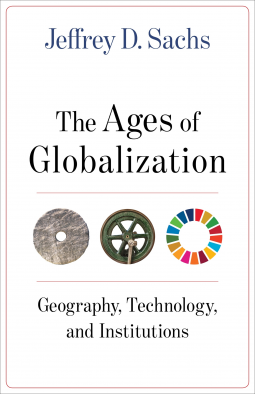
The Ages of Globalization
Geography, Technology, and Institutions
by Jeffrey D. Sachs
This title was previously available on NetGalley and is now archived.
Send NetGalley books directly to your Kindle or Kindle app
1
To read on a Kindle or Kindle app, please add kindle@netgalley.com as an approved email address to receive files in your Amazon account. Click here for step-by-step instructions.
2
Also find your Kindle email address within your Amazon account, and enter it here.
Pub Date Jun 02 2020 | Archive Date Oct 27 2020
Talking about this book? Use #TheAgesofGlobalization #NetGalley. More hashtag tips!
Description
Sachs takes readers through a series of seven distinct waves of technological and institutional change, starting with the original settling of the planet by early modern humans through long-distance migration and ending with reflections on today’s globalization. Along the way, he considers how the interplay of geography, technology, and institutions influenced the Neolithic revolution; the role of the horse in the emergence of empires; the spread of large land-based empires in the classical age; the rise of global empires after the opening of sea routes from Europe to Asia and the Americas; and the industrial age. The dynamics of these past waves, Sachs demonstrates, offer fresh perspective on the ongoing processes taking place in our own time—a globalization based on digital technologies. Sachs emphasizes the need for new methods of international governance and cooperation to prevent conflicts and to achieve economic, social, and environmental objectives aligned with sustainable development. The Ages of Globalization is a vital book for all readers aiming to make sense of our rapidly changing world.
Advance Praise
Praise for A New Foreign Policy: Beyond American Exceptionalism:
“Forceful and angry, Sachs verges on hyperbole in his indictment of America past and present, but he does highlight the perils of continuing on the same path.”
—New York Times Book Review
Available Editions
| EDITION | Other Format |
| ISBN | 9780231193740 |
| PRICE | $28.95 (USD) |
Average rating from 9 members
Featured Reviews
 Reviewer 602942
Reviewer 602942
In this book economist Prof.Jeffrey D. Sachs outlines the dynamics of six previous ages of globalization (The Paleolithic Age, 70,000–10,000 BCE; The Neolithic Age, 10,000–3000 BCE, The Equestrian Age, 3000–1000 BCE, The Classical Age, 1000 BCE–1500 CE, The Ocean Age, 1500–1800, and the Industrial Age 1800–2000) in order to shed light on the current Digital Age of globalization. He argues that each of these previous ages led to new forms of governance, and from this he, concludes that a new global form of governance is needed if we are to successfully overcome the world's three greatest challenges today: 1) the intensification and growth of inequalities of income and wealth, i.e. both the continued existence of extreme poverty across the globe and rising inequalities within rich societies that are worsening due to new technologies that displace workers from their jobs 2) the "violation of planetary boundaries" through human-induced climate change, loss of biodiversity, and increasing pollution 3) the threat of global war and the annihilation of the species through such a war.
As a warning about the dire consequences that will ensue from human-induced climate change if the nations of the world, in particular the United States, continue to ignore the recommendations and advice of technological and scientific experts, this book is an eye-opening treatise that deserves careful consideration.
However, as a history, it is much less successful. Although the author carefully defines each of the terms that appears in the book's subtitle, i.e. geography, technology, and institutions, the author never clearly defines what he means by globalization. Given that no consensus exists among social scientists and historians about the start point of globalization (proposed starting times include: the industrial age in 1800, age of maritime expansion in roughly 1500; and the integration of Asia around 1000, as well as earlier historical markers) and that the author dates globalization to human ancestor's first appearance on earth, providing a definition of globalization and an explanation for his dating are critical. Instead, he assumes that the applicability of the term to "some seventy thousand years ago" when humans first began moving from Africa to other regions of the world is a matter of no controversy. Consequently, the book also includes no discussion of the dates assigned by other social scientists and historians to the process of globalization. This failure to acknowledge or engage with the existing literature on globalization raises some red flags for this book as a work of history that simply cannot be overlooked, despite the book's noteworthy discussion of contemporary challenges.
 Anna O, Reviewer
Anna O, Reviewer
A decent informative read, although I did find my attention wandering a bit near the end of the book.
 Brian B, Reviewer
Brian B, Reviewer
THE AGES OF GLOBALIZATION
Does the world really need another book about globalization? Economist Jeffrey Sachs sure thinks so.
Already renown for his work in development economics, Sachs tries his hand at being a historian with the book The Ages of Globalization, which examines how geography, technology and institutions interact in bringing about large scale global change. Thus, in taking readers through the “seven ages of globalization”—the Paleolithic, Neolithic, Equestrian, Classical, Ocean, Industrial, and Digital Ages—Sachs hopes to let his readers appreciate that “[o]ne can [...] see the history of globalization as a series of scale-enlarging transformations.”
Filtering the historical record through the lens of globalization allows Sachs to provide a focused account unencumbered by the weight of key events. While not entirely omitting all of the latter, many more are glossed over for the sake of driving home the broader point about large-scale social change. As such, The Ages of Globalization is a history book that places a premium on the broader socio-/political-/economic- trend, a parsimony which makes for fascinating reading. To cite one example, Sachs makes the interesting case that the domestication of horses played a unique role in the annexation of territories from around 3000-1000 BCE. He also presents the befuddling conundrum of how the Chinese pulled back on their oceanfaring adventurism and influence at the very time that Western powers were beginning their transcontinental conquests. And there’s understated brilliance in Sachs’ observation that the modern age of globalization represented expansion by the then-powers across ecological zones (i.e., beyond the “lucky latitudes”).
Yet while globalization is at the heart of Sachs’ book, it merely serves as a framing device to draw more substantive insights that may prove relevant to the world today. “Let us keep our eye on five big questions,” he writes,
First, what have been the main drivers of global-scale change? Second, how do geography, technology, and institutions interact? Third, how do changes in one region diffuse to others? Fourth, how have these changes affected global interdependence? Fifth, what lessons can we glean from each age to help us meet our challenges today?
Though it may seem trite to emphasize, by presenting this historical perspective on globalization Sachs inevitably makes the case that the world has always been inherently interconnected. “Globalization,” he observes, “reflects the fundamental fact that the human journey, from our common roots in Africa until today, has always been a shared one.” The difference, if any, has been one of scale. Hence, the great challenge facing us all in this present age of globalization is how institutions must transform given unprecedented levels of interconnection, and what purposes those instructions must serve under the prevailing status quo.
By bringing up this point, Sachs deftly brings his take on globalization’s history in line with his pioneering economic research on poverty. As he has argued elsewhere, putting an end to extreme poverty is already within the grasp of the world’s nations—assuming we all get our act together. With that in mind, he ends The Ages of Globalization on a hopeful note: that for all the uncertainty, populism, and complexity challenging the world today, shouldn’t we turn our energies during today’s globalization toward that noble goal of eliminating extreme poverty throughout the world?
Globalization has been a subject about which much has already been written and discussed; what more needs to be said about it as world events unfold is something pundits will argue ad nauseam. For his part, though, Sachs has made a fine contribution to the literature that readers can learn from for a long time to come.
Readers who liked this book also liked:
John Kotter; Holger Rathgeber
Business, Leadership, Finance, Nonfiction (Adult)








